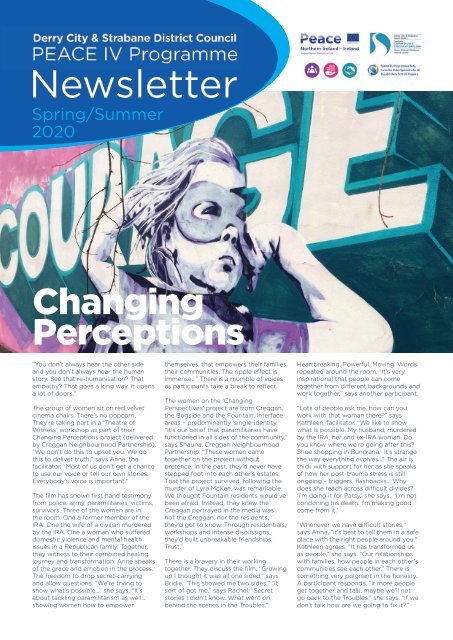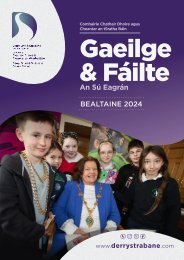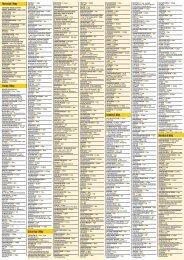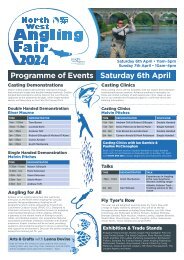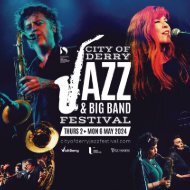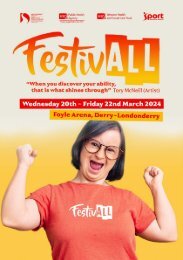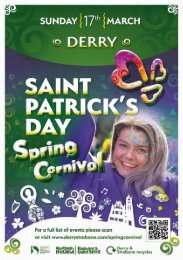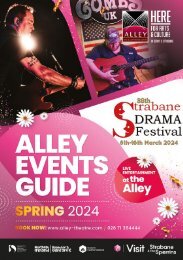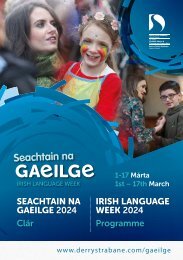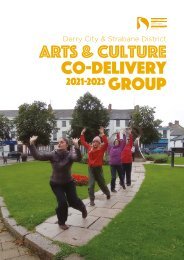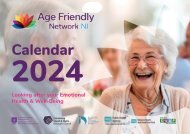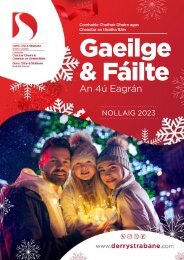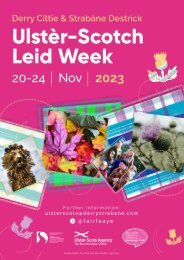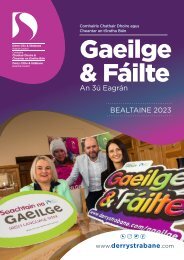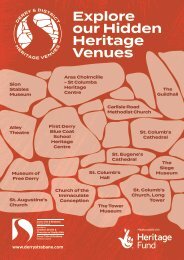PeaceIV Newsletter Spring 2020
You also want an ePaper? Increase the reach of your titles
YUMPU automatically turns print PDFs into web optimized ePapers that Google loves.
<strong>Newsletter</strong><br />
<strong>Spring</strong>/Summer<br />
<strong>2020</strong><br />
Changing<br />
Perceptions<br />
“You don’t always hear the other side<br />
and you don’t always hear the human<br />
story. See that re-humanisation? That<br />
empathy? That goes a long way. It opens<br />
a lot of doors.”<br />
The group of women sit on red velvet<br />
cinema chairs. There’s no popcorn.<br />
They’re taking part in a ‘Theatre of<br />
Witness’ workshop as part of their<br />
Changing Perceptions project (delivered<br />
by Creggan Neighbourhood Partnership).<br />
“We don’t do this to upset you. We do<br />
this to deliver truth,” says Anne, the<br />
facilitator. “Most of us don’t get a chance<br />
to use our voice or tell our own stories.<br />
Everybody’s voice is important.”<br />
The film has shown first hand testimony<br />
from police, army, paramilitaries, victims,<br />
survivors. Three of the women are in<br />
the room. One a former member of the<br />
IRA. One the wife of a civilian murdered<br />
by the IRA. One a woman who suffered<br />
domestic violence and mental health<br />
issues in a Republican family. Together,<br />
they witness to their combined healing<br />
journey and transformation. Anne speaks<br />
of the grace and emotion in the process.<br />
The freedom to drop secret-carrying<br />
and allow questions. “We’re trying to<br />
show what’s possible…” she says. “It’s<br />
about tackling paramilitarism as well…<br />
showing women how to empower<br />
themselves, that empowers their families,<br />
their communities. The ripple effect is<br />
immense...” There is a mumble of voices<br />
as participants take a break to reflect.<br />
The women on the ‘Changing<br />
Perspectives’ project are from Creggan,<br />
the Bogside and the Fountain. Interface<br />
areas – predominantly ‘single-identity.’<br />
“It’s our belief that paramilitaries have<br />
functioned in all sides of the community,”<br />
says Shauna, Creggan Neighbourhood<br />
Partnership. “These women came<br />
together on the project without<br />
pretence. In the past, they’d never have<br />
stepped foot into each other’s estates.<br />
That the project survived, following the<br />
murder of Lyra McKee, was remarkable.<br />
We thought Fountain residents would’ve<br />
been afraid. Instead, they knew the<br />
Creggan portrayed in the media was<br />
not the Creggan, nor the residents,<br />
they’d got to know. Through residentials,<br />
workshops and intense discussions,<br />
they’d built unbreakable friendships.<br />
Trust.”<br />
There is a bravery in their working<br />
together. They discuss the film. “Growing<br />
up I thought it was all one sided,” says<br />
Bridie. “This showed me two sides.” “It<br />
sort of got me,” says Rachel. “Secret<br />
stories I didn’t know. What went on<br />
behind the scenes in the Troubles.”<br />
Heartbreaking. Powerful. Moving. Words<br />
repeated around the room. “It’s very<br />
inspirational that people can come<br />
together from different backgrounds and<br />
work together,” says another participant.<br />
“Lots of people ask me, how can you<br />
work with that woman there?” says<br />
Kathleen, facilitator. “We like to show<br />
what is possible. My husband, murdered<br />
by the IRA, her and ex-IRA woman. Do<br />
you know where we’re going after this?<br />
Shoe shopping in Buncrana. It’s strange<br />
the way everything evolves…” The air is<br />
thick with support for her as she speaks<br />
of how her post-trauma stress is still<br />
ongoing – triggers, flashbacks… Why<br />
does she reach across difficult divides?<br />
‘I’m doing it for Patsy,’ she says. ‘I’m not<br />
condoning his death. I’m making good<br />
come from it.’<br />
“Whenever we have difficult stories,”<br />
says Anne, “it’s best to tell them in a safe<br />
place with the right people around you.”<br />
Kathleen agrees. “It has transformed us<br />
as people,” she says. “Our relationships<br />
with families, how people in each other’s<br />
communities see each other.” There is<br />
something very poignant in the honesty.<br />
A participant responds. “If more people<br />
get together and talk, maybe we’ll not<br />
go back to the Troubles,” she says. “If we<br />
don’t talk how are we going to fix it?”
Shared Space<br />
Orange Heritage & Islamic Traditions<br />
Bryan Adams crackles on the bus<br />
radio. Many of the Senior Citizens on<br />
the bus remember a very different<br />
Summer of ‘69. Today’s crosscommunity<br />
trip is headed for the<br />
Museum of Orange Heritage and<br />
Belfast Islamic Centre. “We’ve been<br />
taking people out of their comfort<br />
zone to places they wouldn’t usually<br />
go,” says Fiona, project worker. The<br />
Triangle, Bonds Street and Shepherds<br />
Glen are geographically close but<br />
socially different. Before this project,<br />
residents had never worked together.<br />
“We’ve really gelled,” says Fiona.<br />
Parenting classes; summer schemes;<br />
sewing classes; Tourist in Our City, the<br />
older people’s project…<br />
“At the beginning you do be a wee<br />
bit, is this going to work?” says Lloyd<br />
“But it’s been fantastic. We’ve done<br />
the 2 cathedrals, St.Columba’s trail,<br />
the Mem (Apprentice Boys Hall), the<br />
cemetery - places you’d walked past<br />
but never been inside. Hearing history<br />
we’d never heard of. Every story has<br />
two sides. Working together – I love it.<br />
My fear is a sudden stop.” He gestures<br />
with his hands. “See if you’re building<br />
trust and communities together, you<br />
have to keep it going, but the man<br />
above is looking down on us. See all<br />
these trips – we haven’t had a bad day<br />
ever.”<br />
“I was never in the Longtower Chapel<br />
or City Cemetery in my life,” says<br />
Arlene. It’s lovely to be able to see my<br />
whole city. “We’d cultural workshops<br />
too – Indian saris, a Scottish ceilidh.”<br />
“This project has linked people – big<br />
time,” adds Thomas. “Fort Dunree – I<br />
didn’t realise how beautiful it was. The<br />
places we’re going today? Never been<br />
in either of them.”<br />
In the Museum of Orange Heritage<br />
there is sshhing as we listen to the<br />
guide. King Billy sits in solid silver<br />
astride his horse. The Glorious<br />
Revolution wasn’t a standalone<br />
incident. The wars in Ireland were part<br />
of events going on across Europe…’<br />
Kings. Queens. Catholics. Protestants.<br />
We hear the history with its quirks and<br />
trinkets. William’s gloves. Lambegs<br />
and banners with biblical scenes.<br />
Posters of rights William introduced<br />
– Freedom of Speech, Trial by<br />
Jury… A 1690 Jacobite coin - James<br />
‘made a mint’ in Dublin - coined<br />
‘Gun money’ from melted weapons<br />
and church bells to pay his troops.<br />
Cannon balls. War medals. Wire<br />
from Belsen Concentration camp.<br />
Uniforms. Collarettes. Displays of<br />
lodges in Brazilian Sugar Plantations<br />
and French Trenches. Orangemen as<br />
social reformers and Gaelic language<br />
enthusiasts. The Battle of the Boyne<br />
lasted half a day. We’re still talking<br />
about it 300 years later.<br />
Over lunchtime stew, May invites<br />
everyone to her church luncheon club.<br />
Annette enthuses about learning Irish<br />
for the first time. “The trips together<br />
are great,” says Sylvia, 94. “I loved<br />
Lifford Jail.”<br />
We take our shoes off entering the<br />
Islamic Centre. “Allah is just the Arabic<br />
for God – Arabic speaking Christians<br />
use the same word,” says Almar. He<br />
shows us a Koran. Leather bound<br />
in navy and gold with Arabic script.<br />
The thick red carpet is patterned<br />
for prayer. Youtube shows us a boy<br />
reciting the Koran from memory. It<br />
triggers a flood of questions. “Do you<br />
have simplified stories like children’s<br />
bible stories?” “What about life after<br />
death? Jesus? Confession?” “That<br />
boxer, Mohammed Ali. He was a great<br />
man...” “Are there many converts?”<br />
“Would ye’s eat a wile lot after sunset<br />
in Ramadam?” Almar explains the 5<br />
pillars of Islam pointing out similarities<br />
and differences with Christianity.<br />
“That was from the heart,” says one<br />
participant as we board the bus home.<br />
“I never would’ve went here. Never<br />
would’ve thought of this.”<br />
“Now remember,” says Fiona, “safety<br />
workshops, the trip to Sligo, the<br />
Peace Walls residential. You’s have<br />
it on those wee leaflets.” She smiles<br />
at conversations up the bus. “You’re<br />
asking about cross-community<br />
friendships?” she whispers. “I’d be<br />
wondering do we need to buy a hat!”<br />
Page 2
The Sash,<br />
the Snow<br />
and the<br />
Tin Whistle<br />
The streets are like a bottle. Blizzard<br />
conditions obscuring red, white<br />
and blue kerbs. I half expect the<br />
Newbuildings workshop to be<br />
cancelled. I don’t expect to walk in on a<br />
tin whistle lesson.<br />
“Where’s the B?” asks one teenager.<br />
“One finger,” says the tutor, Andrew.<br />
They’re talking notes, not insults. “Exact<br />
same fingers as the Bb flute,” says<br />
Andrew. “You’s ’ll find this easy.”<br />
Strains of Three Blind Mice. Hot Cross<br />
Buns. A banner stand being used as a<br />
drum. Lily Bolero. The Queen. The Sash.<br />
Tin whistles held sideways like flutes for<br />
fun. A surreal evening. Not just from the<br />
snow.<br />
“Theobald Boehm invented the<br />
fingering system for flutes and<br />
whistles,” says Andrew. “Flute players<br />
often play tin whistle as a second<br />
instrument.” He explains D is the usual<br />
key for traditional music. Teenagers in<br />
hoodies and runners listen attentively.<br />
The group watch a YouTube clip of a<br />
soldier. “He played in the Edinburgh<br />
Tattoo,” says Andrew. “He’s from a<br />
marching band round Lisburn.” The<br />
Irish Guard plays two tin whistles at<br />
once - top three notes on one whistle<br />
sellotaped so he can harmonise, play<br />
a counter melody alongside the tune.<br />
Faster and faster. Highly skilled. In the<br />
room there’s rhythmic foot tapping.<br />
Spontaneous applause. “That was<br />
lethal.”<br />
Taylor, a young man on the crosscommunity<br />
ARCH project, plays<br />
Londonderry on the Foyle on his Bb<br />
flute. “I’m from Newbuildings Youth<br />
Club,” he says. “The flute’s always been<br />
what’s played in our band. I never even<br />
seen a tin whistle before. It’s exciting<br />
- very similar to the flute. I’ve always<br />
been musical. I do GCSE music.”<br />
“Tonight’s about tin whistle and<br />
bagpipes,” says Chris, project coordinator<br />
with the North West<br />
Cultural Partnership. “A lot of these<br />
teenagers play in marching bands.<br />
They’ve never heard tin whistle.<br />
Given the environment, community<br />
factors, they might never before have<br />
had the chance.” The ARCH project<br />
(Arts, Reconciliation, Culture and<br />
Heritage) is about involving teenagers<br />
in music, dance, drama - safe, fun<br />
ways to experience culture. Respect<br />
and understanding. They’re working<br />
towards a legacy showcase. “We’re<br />
teaching young people it’s okay to have<br />
a culture and also engage with other<br />
cultures.” Six hundred 8-14 year olds are<br />
involved from Clady, Eglinton, Strabane,<br />
The Derg, Lincoln Courts, Rosemount<br />
and all over the city.<br />
“Bagpipes are roughly 3000 years<br />
old,” explains Darren, after a piping<br />
demonstration. “They originated in<br />
Egypt. These Highland ones are only<br />
1000 years old. There’s pipes from<br />
Spain, Northumbria, Border pipes…”<br />
“Are you in a band?” asks one<br />
participant. Darren nods. Bready. He<br />
demonstrates how air travels down the<br />
blowpipe and goes into the bag. The<br />
teenagers guess the names of bagpipe<br />
parts. “What’s this?” “The chanter.”<br />
“This?” “A reed.” “Like a clarinet?” asks<br />
one participant. “Naw,” says a girl. “More<br />
like an oboe.” “Has any of your grannies<br />
ever said would ye stop droning on?”<br />
Darren asks. Nods round the room. “A<br />
drone’s just a noise that keeps going.<br />
Bagpipes have two tenor drones<br />
and a bass drone.” He demonstrates<br />
tuning. “No higher drone like alto and<br />
soprano?” asks a girl.<br />
“The Field Marshall Montgomery band<br />
are five times world champions. They’ve<br />
two players from Newbuildings. Dublin<br />
has the St. Laurence O’Toole Pipe Band.<br />
Two of the best bands are north and<br />
south of the border,” says Darren. “The<br />
Queen has a piper for an alarm clock.<br />
He plays at 8.30am every morning.<br />
Can’t play the same tune twice the<br />
whole year.”<br />
Outside, everywhere is blanketed<br />
white. “You need a lot of skill to play<br />
in a group,” says Andrew, closing the<br />
workshop. “It’s critical we listen to each<br />
other.” He’s right. It is.<br />
Page 3
Homelessness<br />
Going Beyond Tokenism<br />
“It’s all in at Christmas. Come summertime, no-one wants<br />
to talk about it,” says Martin (First Housing). “You can<br />
be homeless for 101 different reasons but we all just see<br />
somebody on the street corner with a brown paper bag<br />
and a bottle… that’s a very small part of homelessness.”<br />
In the Derry and Strabane area NIHE accepted 1315<br />
people as homeless. Noel McNulty NIHE Local manager<br />
in Strabane Office. “The people coming in are getting so<br />
complex,” says Noel, NIHE Strabane Manager. “We’re not<br />
health professionals. Our waiting lists are filled with single<br />
males and pensioners. Demand for single lets is double the<br />
availability.”<br />
It is about discrimination. In days gone by, the ads in<br />
England read “No Blacks. No Irish. No Dogs.” “All the<br />
adverts locally are No DHSS…” says Kat. “The issues impact<br />
Travellers worse. Landlords see a Traveller surname…”<br />
It’s also about resources. “We’ve supported housing,” says<br />
Aidy, First Housing. “Staff dealing with residents self-harm<br />
at 4am would earn more working at the cinema.”<br />
The conference in Strabane is part of the Beyond Tokenism<br />
project, led by Lettershandoney and District Development<br />
Group and bringing together people from Black and<br />
Minority Ethnic, Disability, LGBT, political ex-prisoners and<br />
victims/survivor’s groups. “The five groups we represent<br />
disproportionately face homelessness as an issue,” says<br />
Kat (Social Justice Trust). “This conference kicks off our<br />
research. We need collaboration. Risk taking. Creative<br />
thinking.” “It’s a strategic project,” says Aggie (Foyle Racial<br />
Equality Forum). ‘Homelessness – not just on the street.<br />
Also hidden homelessness.”<br />
The quiz focuses minds on statistics. The number officially<br />
homeless in the world? 100 million. People lacking<br />
adequate housing? 1.6 billion. 25%. Of everyone. Closer<br />
to home, in 2018, 55,000 presented as homeless to<br />
the NIHE (Northern Ireland Housing Executive). 18,000<br />
households. In 2019 NIHE allocated £1.8million to dealing<br />
with homelessness. Murmurs. It’s a lot of money in a<br />
population of 1.8 million. At one recent count, there were<br />
13 rough sleepers in Derry. Disproportionately they’re<br />
from minority ethnic backgrounds. Who’s to blame?<br />
Participants discuss addiction, mental health, government<br />
policy, community spirit, individual responsibility. “It can’t<br />
be one single cause,” they say. “The biggest presenters<br />
are single males. The biggest causes are tenancies ending,<br />
relationship breakdown, drugs and alcohol, mental health<br />
and affordability.” Can foreign homeless people get NIHE<br />
accommodation? It depends. It’s complicated. More so now<br />
with Brexit.<br />
And also about reframing the conversation. “That term<br />
voluntary homelessness. It’s problematic,” says Alexa,<br />
Transgender NI. “How we talk about homelessness - there’s<br />
an aspect of victim blaming… you chose to come out as<br />
trans… you chose to drink… we see the coping mechanism<br />
as the reason for the homelessness, not the symptom<br />
of social alienation. Often it’s not that Trans people are<br />
kicked out by their families,” she explains. “It’s that they’re<br />
choosing to leave an unsafe situation that’s causing them<br />
damage. We avoid going to the root of this because it’s<br />
complicated. We’ve stayed too orange and green to focus<br />
on the crisis impacting our communities.”<br />
From conversations at the conference, three things are<br />
needed. Early intervention. Sustainable solutions. Working<br />
together.<br />
Page 4
Don’t<br />
Judge<br />
a Book…<br />
The venue is Strabane Library, but<br />
the book borrowing in the Strabane<br />
Shared Spaces project is completely<br />
different. ‘We’ve human books in the<br />
room today,’ says Gerard, Holywell<br />
Trust. ‘They’ll each tell you their own<br />
true story. Please treat the books with<br />
respect.’ Participants move to different<br />
tables. Conversations start.<br />
“I’ll not tell you how old I am but<br />
I bought the Beatles first single<br />
on vinyl,” says Jennifer, a female<br />
with transgender history. “I always<br />
gravitated to girl’s things. By seven,<br />
I knew intrinsically I was a girl. I<br />
prayed. Puberty was horrendous. I<br />
was 17 before I came across the word<br />
transgender.” Participants listen. “We’re<br />
taught at school there’s two genders,<br />
but gender is a spectrum. It’s not as<br />
cut and dried as we think. Epigenetics,<br />
chromosones, genes, cells… it’s<br />
complicated. Sexual orientation is who<br />
you’re attracted to. Gender identity is<br />
who you are. Gender dysphoria is like<br />
a female brain in a male body or vice<br />
versa. I came to Derry to transition.<br />
For me, it was a safe place to become<br />
the person I always was. One my life’s<br />
greatest moments was getting my new<br />
birth certificate. It said girl.”<br />
Participants ask questions. Everything<br />
is on the table. Puberty blockers,<br />
gender affirmation surgery, family<br />
impact, conversion therapy, religion,<br />
mental health, differences north and<br />
south of the border. “Today is my first<br />
time to meet a transgender person,”<br />
says one participant. He smiles.<br />
“I’m Liam. Originally from Dungiven,”<br />
says another book. ‘I remember<br />
thinking at Primary School maybe<br />
I’ll be a Republican when I grow up.’<br />
He recalls witnessing trauma after<br />
Burntollet; being in Derry on Bloody<br />
Sunday. ‘I’d a mouthful of CS gas. It<br />
forced me to the back of the march.<br />
Then I heard the firing. Early 75 I joined<br />
the INLA...’<br />
Remand in Crumlin Road. A tenyear<br />
sentence. H Block 3. “Our job<br />
inside was to resist criminalisation.<br />
No washing. No prison uniform.<br />
Wrapping ourselves in prison blankets.<br />
I could hear thumps, shouts, forced<br />
washing, beatings. I also began to<br />
read the bible,” he says. “One of the<br />
lines, forgive us our sins as we forgive<br />
others, seemed too far. That meant<br />
the RUC, British Army, Loyalists, the<br />
whole works. I prayed the prayer of<br />
St.Francis – to understand rather than<br />
be understood…”<br />
“The whole thing was an era of<br />
aggression. Beatings. Shootings. The<br />
Iron Lady. We wanted political status.<br />
Through small holes under heating<br />
pipes a cigarette paper was passed…<br />
I put my name down for the Hunger<br />
Strike. I just thought, no matter what<br />
comes – pain, psychological pressure<br />
– just don’t let the side down.” Liam<br />
pauses. “But I was changing. That<br />
prayer… A foot in God’s camp and a<br />
foot in the Republican Camp. Prisoners<br />
cheered the deaths of 19 paratroopers<br />
at Narrow water. That night I prayed<br />
for their souls.” Participants are<br />
attentive. “Hunger was the big thing.<br />
After 4 weeks that passes. Day 44 my<br />
eyesight started to go. I was violently<br />
sick. Day 50 I went blind. Day 55 my<br />
energy was leaving fast. I was sorry I<br />
had to die.” Liam describes the priest<br />
and his mother coming in to intervene.<br />
The decision to stop. Recovery in<br />
Musgrave. Personal reflections. “After<br />
much mental struggle I dropped the<br />
Republican end,” he says. “I went 100%<br />
spiritual. I lived to tell the tale. My main<br />
reason for doing this is to emphasise<br />
the need to forgive. There’s a lot of<br />
trauma that hasn’t moved on.”<br />
Over lunch, participants reflect on the<br />
overall project. “It was great to have<br />
the chance to shape the programme,”<br />
says Bríd, Lifford Clonleigh Resource<br />
Centre. ‘It’s the first time in years we’ve<br />
networked cross-border with Strabane<br />
groups.” “The project has had different<br />
elements,’ says Craig, facilitator. “A<br />
Steering Group, Women’s Project,<br />
Music Project, Cemeteries project…<br />
we’re contributing to an empathy<br />
revolution. That’s transformative.”<br />
Page 5
Burning Issues<br />
Something is afoot with bonfires. Not<br />
the ‘same old.’ Something new.<br />
“Crowds came from Irish street, Top<br />
of the Hill, everywhere. Deckchairs,<br />
wheelchairs, families, older residents…<br />
they arrived at 4pm and stayed until<br />
the fireworks,” says Claire, Community<br />
Worker in Irish Street. “Jimmy Buckley<br />
had a Dublin Reg Mercedes. He was<br />
like “Am I OK? Is my car alright?”<br />
By the time he hit the stage he was<br />
“Unbelievable. Such a welcome!”<br />
Claire smiles. You’d be forgiven for not<br />
realising she’s describing bonfire night.<br />
At an interface.<br />
Bonfires are a tough area of peace<br />
work. A poisoned chalice with rare<br />
breakthroughs. So what’s changed with<br />
the PEACE IV Bonfires/Alternatives<br />
project?<br />
“Previously council had no reference<br />
point for bonfires – no policy, no<br />
officer,” says Sean, Community<br />
Engagement Officer on bonfires. He<br />
recalls the project starting two years<br />
ago. “Bonfires were a high profile issue<br />
in many council areas. In unionist areas<br />
the move on bonfires was seen as<br />
a cultural attack. In nationalist areas<br />
bonfires were in defiance at unionist<br />
bonfires and largely unwanted events<br />
by the majority within the community.<br />
The flip side was communities wanted<br />
to transform their celebrations. Some<br />
for total alternatives, others in terms of<br />
toxic materials and flags.” Sean’s job?<br />
Connect with communities, build trust,<br />
transform practice. Tough enough<br />
for one bonfire. The council area<br />
has nineteen.<br />
“11th July, 12th August, 15th August,<br />
Hallowe’en…” Sean gestures across<br />
landscape. “Bonfires spanned from<br />
Castlederg to Creggan. We started<br />
with scoping who, what, where and<br />
why – understanding the dynamics, the<br />
influences behind the fires.”<br />
Key initial building blocks included a<br />
council bonfires policy and an all-party<br />
interagency working group. “Political<br />
consensus means we’re possibly the<br />
only council issuing unified press<br />
statements,” says Sean. “The bonfires<br />
policy when developed was endorsed<br />
by all political representatives at that<br />
time and recognises bonfires as a<br />
legitimate cultural expression if done<br />
safely and respectfully.” In the political<br />
and community context, confidence<br />
and trust building, frank conversations<br />
and confidential meetings were<br />
essential. Listening, understanding<br />
and engaging communities in action<br />
planning was vital.<br />
Seeking external support was of great<br />
assistance. The Diamond Regeneration<br />
group in East Belfast hosted a site visit<br />
and then facilitated a cross<br />
community conference in<br />
Derry and Strabane Council area. They<br />
explained howbonfire celebrations<br />
there were transformed through<br />
connection with neighbourhood<br />
regeneration and re-imaging.<br />
“Every neighbourhood’s different,”<br />
explains Sean. “The next stage was<br />
cross-community. Collective dialogue<br />
asking what would impact positively?<br />
What were shared issues? Anti-social<br />
behaviour? Fly tipping? Interface<br />
tensions? What did communities want?<br />
Tyres, flags and election posters or<br />
wood only emblem free? Could working<br />
together create unity?” Engagement<br />
became dynamic. Constructive. The<br />
project wasn’t about usurping but<br />
enhancing celebrations – making area<br />
plans with agreed goals.<br />
Collectively council, communities,<br />
statutory agencies and emergency<br />
services, co-ordinated cross-community<br />
training - Events management, bonfires<br />
alternatives, health and environment<br />
awareness, good relations, fire safety.<br />
Page 6
Conferences, site visits and dialogue<br />
challenged thinking and awareness.<br />
“Clooney, Irish street, Lincoln Courts,<br />
Galliagh, Bogside, Creggan, Top of the<br />
Hill… people worked to understand<br />
each other’s communities,” says Sean.<br />
“Ultimately they championed each<br />
other’s areas and positions.” When a<br />
Waterside community worker said<br />
“We want an event like in the Gasyard<br />
– no alcohol, no flags.” Bogside<br />
community workers said “We’ll support<br />
you in getting that.”<br />
It wasn’t just talk. “The project’s<br />
been hands on. We’d direct access<br />
to council,” says Claire from Irish<br />
Street. “If the lads needed non-wood<br />
materials lifted, it worked. That feeling<br />
of being understood… Council got<br />
their heads round the why Protestant<br />
communities want bonfires. It’s about<br />
cultural diversity.” She grins. “You could<br />
say council’s really flown the flag.”<br />
“Council’s changed thinking was<br />
significant,” says Alison, Waterside<br />
Neighbourhood Partnership Manager.<br />
“The policy, protocols, the working<br />
group… mindsets changed. Unionist<br />
bonfires were recognised as a cultural<br />
celebration. That enabled working with<br />
communities on event management<br />
and hard conversations about what’s<br />
burned.”<br />
The project built on existing work.<br />
“We’d already tackled tyres and<br />
anti-social behaviour,” says Don from<br />
Clooney. “PEACE funding took us<br />
further – a culturally oriented day.<br />
Pipes. Drums. Highland dancing. With<br />
mediation the fire’s down to one flag.<br />
The event is properly stewarded. It’s<br />
the progression of five year’s effort.<br />
We need continuing education. These<br />
boys are engaging but there’ll be a<br />
next group.”<br />
Community workers identified<br />
strength in combined working.<br />
“Tackling bonfires here is a genuine<br />
multi-agency thing going on eight,<br />
nine years,” says Cathal, Shantallow<br />
Centre Manager. “This community<br />
doesn’t want bonfires. Our alternative<br />
summer programme is a collective<br />
effort. PEACE money filled in gaps.<br />
Working with bonfire builders meant<br />
we’d only one bonfire. 300 tyres were<br />
removed. No toxic material. No reports<br />
of anti-social behaviour. No arrests.<br />
Three times young people moved the<br />
bonfire – away from gas mains, roads,<br />
housing.” Galliagh’s bonfire strategy<br />
involves eight weeks of developmental<br />
work with teenagers and a residential.<br />
200 teenagers are away on bonfire<br />
night. The same teenagers run the<br />
summer programme – turning former<br />
bonfire sites into community fun days.<br />
“Young people usually collecting<br />
were doing their bit instead – setting<br />
up, contributing positively. Or saying<br />
we can’t build here, there’s weans on<br />
bouncy castles...”<br />
Conchúr, Youth and Health Coordinator,<br />
reflects on the situation<br />
years previous. “One weekend cost<br />
over £100,000 damage. Road surfaces,<br />
traffic islands, police and fire callouts…<br />
never mind the social impact of a<br />
community in distress. All it takes is<br />
investment. In this area, with funding,<br />
we can eradicate bonfires.”<br />
Success went beyond the city. In<br />
Castlederg the bonfire was swapped<br />
for a three day festival with broad<br />
community appeal. “The marquee<br />
beside the Orange Hall had GAA<br />
supporters and local bandsmen,”<br />
says Sean. “In Newtownstewart the<br />
Somme Memorial Hall is close to the<br />
GAA club. The family event had a flute<br />
band parade and a wood only, emblem<br />
free bonfire. People from different<br />
communities intermingled.”<br />
Yes, there are setbacks. Some<br />
communities aren’t yet engaged. Flags<br />
remain an issue. Clearly though, the<br />
project is influencing behaviour. Of<br />
19 bonfires, this year only 2 burned<br />
tyres. Paramilitary flags and poppy<br />
wreathes were removed. Communities<br />
empowered. “Despite everyone’s best<br />
efforts,” says Sean, “with bonfires<br />
sometimes at the last minute things<br />
go backwards.” This project breeds<br />
cautious optimism. Sometimes things<br />
go forwards.<br />
Page 7
After Armageddon<br />
After Armageddon we emerged<br />
michelined and yawning<br />
wide-eyed at first<br />
stretching legs and vocal chords.<br />
After Armageddon children spoke<br />
of baking bread and garden plantings<br />
parents basked in forest birdsong<br />
elders embraced in ballroom dancing.<br />
After Armageddon workers in pubs sat<br />
mesmerised by bubbles in fresh pulled pints<br />
cafés refilled with clatter<br />
communities conveyed thanks.<br />
After Armageddon people professed<br />
new-found love for opera<br />
opened doors into pristine houses<br />
welcoming grubby fingerprints.<br />
After Armageddon we looked skywards<br />
in collective wondering<br />
writers published wisdom and epitaphs<br />
Forget-me-nots sang anthems of resistance.<br />
Are you taking part yet?<br />
There is something for everyone in our Council PEACE IV Programme. Why not get<br />
involved and support peace in person? Contact us – we’re happy to help direct you to<br />
something that meets your interests.<br />
Want more information?<br />
Sign up for our monthly e-bulletin at www.derrystrabane.com/Peace-IV or<br />
browse our website.<br />
The PEACE IV Team can be contacted at:<br />
Email: peace@derrystrabane.com<br />
Tel: 028 71 253 253<br />
A project supported by the European Union’s PEACE IV Programme, managed by the Special EU<br />
Programmes Body (SEUPB).<br />
Page 8


